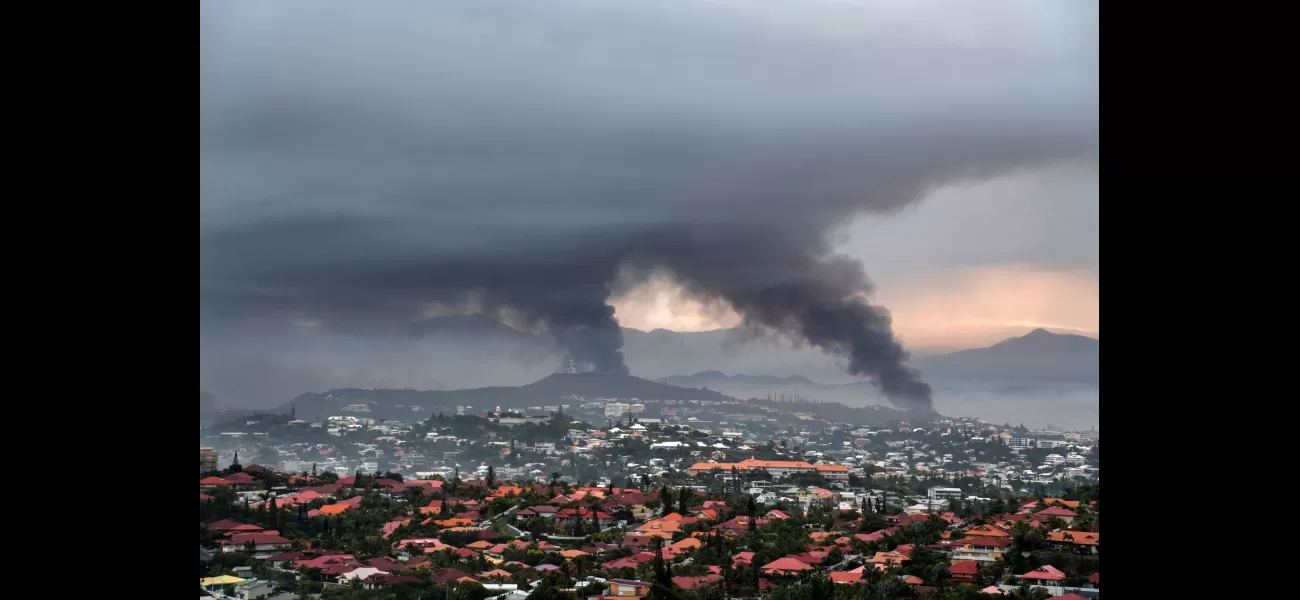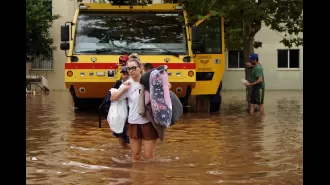French authorities have reported a sixth death in the ongoing violent clashes in New Caledonia.
6th death in ongoing violent protests in the archipelago, where native people have been fighting for independence.
May 18th 2024.

Over the past week, there have been reports of escalating violence in the French Pacific territory of New Caledonia. The situation has become increasingly dire, with the death toll now reaching six as a result of armed clashes. The archipelago, which has long been home to an indigenous population seeking independence, has been engulfed in chaos and unrest.
According to a security official who spoke on the condition of anonymity, the latest fatality occurred during an exchange of gunfire at one of the many makeshift roadblocks that have been set up across the island. Two others were also seriously injured in the clash, as confirmed by French media outlets. The incident took place in the northern part of the main island, at a location known as Kaala-Gomen.
The person who was killed has been identified as a man, and it has been reported that his son was among the injured. The violence this week began with protests over voting reforms that have been met with strong opposition from pro-independence supporters. These tensions have now escalated into armed clashes, looting, arson, and other forms of destruction that have turned parts of the capital city of Noumea into no-go zones.
The streets are now littered with burned-out cars, while businesses and shops have been ransacked. The damage is extensive, with buildings reduced to smoking ruins and thick clouds of smoke filling the skies of the South Pacific. Despite the efforts of the French government to impose a state of emergency and send reinforcements to regain control, violence continues to plague the streets of Noumea.
According to the mayor of Noumea, Sonia Lagarde, although the violence has somewhat subsided since the implementation of a curfew from 6pm to 6am, the situation is far from normal. She described the aftermath as a "spectacle of desolation" and expressed concern that the city is still under siege. Residents are afraid to leave their homes, and those who do venture out are met with the threat of violence.
The state of emergency has granted authorities increased powers to deal with the violent protesters. This includes the ability to impose house detention on those deemed to be a threat to public order, as well as the authority to conduct searches, seize weapons, and restrict movements. Those who violate these measures may face jail time. The last time such measures were imposed on a French overseas territory was in 1985, also in New Caledonia, according to the Interior Ministry.
The underlying tensions in New Caledonia stem from decades of conflict between the indigenous Kanak people who desire independence and the descendants of colonizers who want to maintain ties with France. The recent unrest coincides with debates in the French legislature about amending the constitution to make changes to voter lists in New Caledonia. This includes allowing residents who have lived in the territory for 10 years to participate in provincial elections.
However, opponents of this measure argue that it will only benefit pro-France politicians and further marginalize the Kanak people who have long suffered from discrimination and segregation policies. With a population of about 270,000 people, the vast archipelago of New Caledonia is located 10 time zones ahead of Paris and continues to face a turbulent and uncertain future.
According to a security official who spoke on the condition of anonymity, the latest fatality occurred during an exchange of gunfire at one of the many makeshift roadblocks that have been set up across the island. Two others were also seriously injured in the clash, as confirmed by French media outlets. The incident took place in the northern part of the main island, at a location known as Kaala-Gomen.
The person who was killed has been identified as a man, and it has been reported that his son was among the injured. The violence this week began with protests over voting reforms that have been met with strong opposition from pro-independence supporters. These tensions have now escalated into armed clashes, looting, arson, and other forms of destruction that have turned parts of the capital city of Noumea into no-go zones.
The streets are now littered with burned-out cars, while businesses and shops have been ransacked. The damage is extensive, with buildings reduced to smoking ruins and thick clouds of smoke filling the skies of the South Pacific. Despite the efforts of the French government to impose a state of emergency and send reinforcements to regain control, violence continues to plague the streets of Noumea.
According to the mayor of Noumea, Sonia Lagarde, although the violence has somewhat subsided since the implementation of a curfew from 6pm to 6am, the situation is far from normal. She described the aftermath as a "spectacle of desolation" and expressed concern that the city is still under siege. Residents are afraid to leave their homes, and those who do venture out are met with the threat of violence.
The state of emergency has granted authorities increased powers to deal with the violent protesters. This includes the ability to impose house detention on those deemed to be a threat to public order, as well as the authority to conduct searches, seize weapons, and restrict movements. Those who violate these measures may face jail time. The last time such measures were imposed on a French overseas territory was in 1985, also in New Caledonia, according to the Interior Ministry.
The underlying tensions in New Caledonia stem from decades of conflict between the indigenous Kanak people who desire independence and the descendants of colonizers who want to maintain ties with France. The recent unrest coincides with debates in the French legislature about amending the constitution to make changes to voter lists in New Caledonia. This includes allowing residents who have lived in the territory for 10 years to participate in provincial elections.
However, opponents of this measure argue that it will only benefit pro-France politicians and further marginalize the Kanak people who have long suffered from discrimination and segregation policies. With a population of about 270,000 people, the vast archipelago of New Caledonia is located 10 time zones ahead of Paris and continues to face a turbulent and uncertain future.
[This article has been trending online recently and has been generated with AI. Your feed is customized.]
[Generative AI is experimental.]
0
0
Submit Comment





